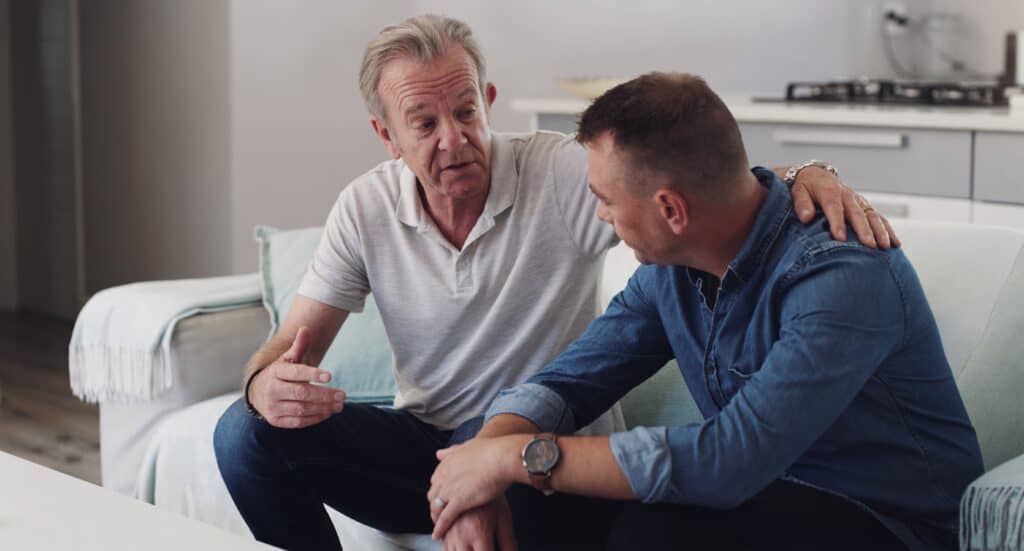How To Get Someone Into Rehab
Watching someone you love struggle with addiction is one of the most painful, challenging things you will ever do. You might try to reason with your loved one time after time, encouraging them to seek professional help. Despite your best intentions, you are met with nothing but anger and hostility. Attempting to help an addicted loved one often leaves you feeling helpless, hopeless, and alone. Fortunately, there are steps you can take to help your loved one get into rehab.
At Lexington Addiction Center, we know how difficult it is to watch a loved one suffer as you stand on the sidelines, feeling hopeless and alone. Many of our staff members have helped a loved one through the treatment process, or have gone through the process themselves. This allows us a unique, compassionate perspective. As soon as you make the decision to reach out, we will help you in any way we can. Not only will we help you get a loved one into rehab in Lexington, Kentucky — we guide you through every step of the process from start to finish. Contact us today to begin.
Helping a Loved One Get Into Rehab
The first step towards getting a loved one into rehab is encouraging them to accept that professional help has become necessary. However, because addiction and denial go hand-in-hand, many people believe they can handle the issue on their own. They might insist that seeking professional help is uncalled for. Additionally, they might deny that a problem exists altogether.
Someone who is struggling with addiction is typically defensive when their substance use is brought up in conversation. They might say things like:
- “I can quit on my own when I want to, I just don’t want to yet.”
- “My substance use doesn’t affect anyone but me; I’m only hurting myself.”
- “People should mind their own business.”
- “When my substance use becomes a problem I’ll consider seeking help.”
- “Rehab is overpriced and unnecessary, I can quit without help when I decide to.”
To the rest of the world, it has become abundantly clear that substance use has gotten out of hand. But to the person struggling with addiction, everyone is “making a big deal out of nothing.” This can be highly frustrating. Remember that denial is a defense mechanism, and it can be overcome with some degree of professional help.

Steps to Get a Loved One Into Rehab
There are certain steps a person can take to help a loved one get into rehab. However, it is important to note that professional help is often necessary. If a person is struggling with a moderate or severe substance use disorder and has repeatedly put their life in danger, staging a professional intervention is a good idea.
During a professional intervention, a licensed interventionist facilitates a structured meeting. The loved ones of the addict or alcoholic gather in a neutral location. They share the ways the addiction has been impacting them, setting boundaries and encouraging their loved one to seek professional help. The goal is to get the addict or alcoholic into treatment that very same day.
Staging a professional intervention is a good idea if:
- A person is at immediate risk of a life-threatening overdose.
- A person repeatedly puts themselves or other people in danger (for example, they often drive their young children to school while intoxicated).
- A person is suffering from a substance use disorder that is getting progressively worse.
- A person has an underlying mental or physical health condition and substance use must be stopped immediately.
At Lexington Addiction Center we work directly with several reputable, licensed interventionists in the Lexington area. Contact us today to learn more, or to be put into contact with a professional interventionist.
Educate Yourself on Addiction and Addiction Treatment
When it comes to helping a loved one get into rehab, knowledge is power. One of the best steps a person can take when attempting to help a loved one get into rehab is thoroughly educating themselves on the Disease Model of Addiction. Understanding addiction as a chronic and relapsing health condition allows for more compassion and patience.
Additionally, seeking resources on effective treatment options is beneficial. The best treatment services for one individual might not be as effective for another. Consequently, the most appropriate level of care varies depending on the needs of each individual.
Plant the Seed
Maybe a person is not ready to seek treatment, and their substance use disorder is not quite severe enough to warrant a professionally staged intervention. If this is the case, “planting the seed” is a good route to take. If a person knows (even subconsciously) that treatment is available to them, they are more likely to seek help down the line.
This might look like casually bringing up addiction treatment in conversation. When doing so, avoid coming across as accusatory or condemning. For example, say something like, “There are a lot of great addiction treatment options in Lexington for those in need of clinical care.” If a loved one has been experiencing consequences directly related to their drinking or drug use, gently encouraging them to seek some degree of help is often productive. However, avoid utilizing guilt, blame, or anger. Always speak from a place of compassion and concern.
Questions to Ask Your Loved One
- “Do you use alcohol or drugs despite a desire to quit?”
- “Have your loved ones expressed concern about your drinking or drug use?”
- “Has alcohol or drug use affected your relationships, career, or finances?”
- “Do you often experience changes in mood, finding yourself irritable and agitated?”
- “Do you experience withdrawal symptoms when you stop drinking or using drugs?”
- “Do you know your life would be better if you stopped drinking or using drugs?”

Set and Maintain Personal Boundaries
Setting personal boundaries can be difficult for people who are concerned about the well-being of a loved one who is struggling with addiction. At first, setting and maintaining boundaries might seem cold, callous, and counterintuitive. However, personal boundaries often facilitate reaching out for help sooner rather than later. Repeatedly saving a loved one from the consequences of their own actions can hinder their personal recovery.
Examples of personal boundaries are:
- Cutting off communication with an addicted loved one until they agree to seek help
- Cutting off financial support/not giving a loved one money, even for things like “groceries” or “medical care”
- Disallowing an addicted loved one from staying in the family home rent-free, or disallowing them from living in the family home while they are actively using drugs or drinking
- Limiting one-on-one contact
- Giving helpful ultimatums, for example, “The cell phone bill is not going to be paid until you agree to undergo drug withdrawal in a designated detox center”
It is important to remember the importance of self-care. Setting and maintaining personal boundaries also helps the loved ones of an addict or alcoholic prioritize their own needs. Seeking therapeutic care or the guidance of an addiction specialist comes recommended. In addition, there are many 12-Step support groups designed to help the loved ones of people in active addiction.
Offer to Help While Your Loved One Is in Treatment
Some people are apprehensive about seeking treatment because they are concerned about leaving their personal responsibilities and obligations unattended. When encouraging a loved one to go to drug rehab in Lexington, it is a good idea to offer help while they are away. Offer to collect their mail, take care of their pets, or ensure their bills are paid on time. Of course, only agree to help out in ways that feel feasible.
How to Get Someone Into Rehab at Lexington Addiction Center
At Lexington Addiction Center, our goal is to make the recovery journey as straightforward as possible. We help each of our clients overcome addiction and begin thriving in their personal lives. In addition, we focus on restoring healthy family dynamics. Active addiction affects everyone it touches. In order for sobriety to be maintained long-term, all members of the family must heal simultaneously.
We offer several effective levels of care at our drug and alcohol rehab in Lexington, Kentucky. Family therapy is an important component of each level of clinical care we provide.
- Partial Hospitalization (PHP) — Our PHP program offers intensive therapeutic care with more flexibility than a traditional inpatient rehab program allows. PHP is an ideal solution for those with moderate to severe substance use disorders who prefer to live at home while undergoing treatment.
- Intensive Outpatient Treatment (IOP) — Our IOP program in Lexington, Kentucky provides slightly more flexibility than PHP. IOP is ideal for those with personal responsibilities (like work or school) that they cannot entirely step away from.
- Outpatient Treatment (OP) — Our OP program offers a highly flexible level of care and a fair amount of personal freedom. OP combines evidence-based therapies with life skills and relapse prevention training, helping clients successfully reintegrate into society.

Addiction Rehab in Lexington, KY
Helping someone you love get into addiction rehab in Lexington, Kentucky is not always easy. However, with the right amount of support and professional guidance, you can help your loved one receive the life-saving care they need to thrive. Contact us directly to learn more about how to get your loved one into addiction rehab today.
Did you know that your insurance plan may cover medical detox?
Resources
Contact Us
Set yourself free from the struggles of addiction and co-occurring mental health disorders. Reach out to our treatment team in Lexington, Kentucky today.